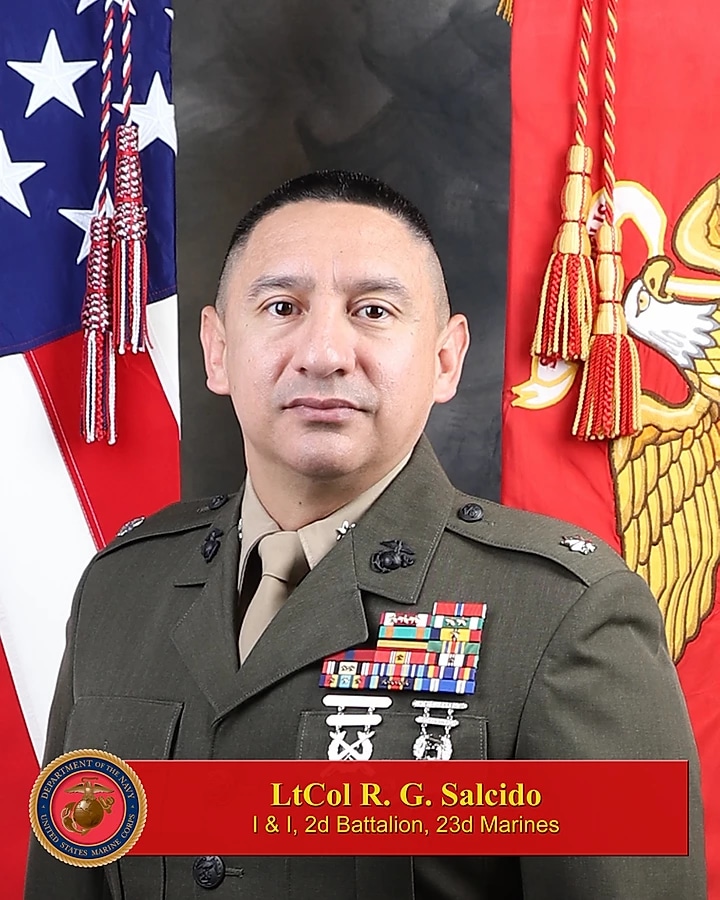Authenticity and a positive attitude
Great article on leadership that could apply in the business world by LtCol Rudy G. Salcido, my longtime friend from the USMC.
>LtCol Salcido is an Infantry Officer currently serving as the Operations Officer, 13th MEU and the Inspector & Instructor, 2d Bn, 23d Marines. He deployed in support of Operation IRAQI FREEDOM I and II (2003 and 2004) and also served in Operation ENDURING FREEDOM 12.2-13.1 (2012-2013).
www.mca-Marine Corps Gazette • August 2019 marines.org/gazette 59
Effective problem-solving is a collective task that requires participants to think critically ,collaborate, and cooperate. Leaders around the world face the daily challenge of facilitating positive working environments to draw the best out of the people they lead. To tackle the increasingly complex problems that have yet to be exposed, leaders must be engaged with their subordinates to solicit creative and practical solutions if they wish to address the issues in a timely and efficient manner. As the Marine Corps understands, “Group dialogue, when conducted within the proper command climate, can foster a collective level of understanding not attainable by any individual within the group regardless of experience or seniority.”1 However, group dialogue alone will not contribute to new and valuable ideas. By exemplifying humility, authenticity, and a positive mental attitude, leaders will experience better results leading diverse teams engaged in problem-solving.
Humility
Arrogance is the blemish many leaders display, and often these leaders fail to listen to the opinions of others. This flaw is further exasperated when these leaders self-determine themselves to be the smartest people in the room. This is the first sign toward a loss of purpose, progress, and the collaboration needed to produce the best solution under a compressed timeline. MCDP 1, Warfighting articulates the following:
Relations among all leaders—from corporal to general—should be based on honesty and frankness regardless of disparity between grades. Until a commander has reached and stated a decision, subordinates should consider it their duty to provide honest, professional opinions even though these may be in disagreement with the senior’s opinions. However, once the decision has been reached, juniors then must support it as if it were their own. Seniors must encourage candor among subordinates and must not hide behind their grade insignia. Ready compliance for the purpose of personal advancement—the behavior of ‘yes-men’—will not be tolerated.2
These written words are profound in compelling our leaders to seek input from all sources of information. Our leaders must incorporate these actions into their leadership style and approach; the key to this involves personally adopting a dose of humility to fall within the spirit of these written words.
Research by Morris, Brotheridge, and Urbanski defines humility as acknowledging what you can and cannot control, a willingness to listen to new ideas, a willingness to learn from others, and as the opposite of arrogance.3 For example, a commander and an operational planning team leader can use the words as a guide before the start of the planning process. Maximizing the available potential must be the goal of the commander. To effectively plan, people must be allowed to provide honest opinions and quality information supported by researched data. The leader must create this environment through positive reinforcement to encourage subordinates to express valid opinions. Subordinates must take ownership of their contribution to the planning process, and leaders must establish the command climate. Ricks captures Dwight D. Eisenhower’s lesson of the war: “Cooperation was more important than anything else.”4 It is important to create conditions within a unit where a diverse set of people can thrive.
Authenticity
Marines have an uncanny ability to sniff out “fakeness,” and any display of humility must be authentic to achieve the best results. In an era accepting of plastic surgery and fabricating a physical new you, there are no quick fixes for personality flaws. President Abraham Lincoln, nicknamed “Honest Abe,” is considered an authentic leader. President Lincoln regularly visited his subordinates at their locations, often in the field, treating them with dignity and respect and gaining their admiration.5 In the same way, authentic leaders are willing to hold people accountable; they are not afraid to confront issues directly, they allow subordinates to learn from mistakes, and they do not add to the self-induced friction of an organization.
They act in a swift, meaningful, and productive manner. Additionally, leadership by example works in tandem with an authentic leader’s approach to leadership as described by Ernst Jünger in the following passage:
At three in the afternoon my sentries came to me from the left and stated they were unable to hold out where they were any longer, as their holes had been shot away. I had to display my full authority to get them back to their stations. What helped me make my case was the fact I myself was in the place of greatest danger.6
A measure of authenticity is emotional quotient (EQ); possessing EQ provides the leader the mental agility to properly interact with different personalities to achieve mission success. Leaders must display a sincere desire to know the people he leads to allow EQ to be impactful. Leaders must know their people, and humble leaders will put them first. We typically recognize this as servant leadership, and it is an indication of authenticity. Servant leadership is not about the leader but about the people whom he leads on a daily basis and for a good reason. Our people are the most valuable asset we are responsible for, and they deserve an authentic leader to serve them. When you care for your people, your people tend to care for you. As leaders, we strive to draw the best from our subordinates and inspire those we lead. Effective leaders naturally create a positive and productive environment conducive to critical thinking. Creativity and innovation will flourish in an environment where candor is valued and where honest mistakes are tolerated, not punished.
Authenticity is an important attribute to sustain our people’s enthusiasm, performance, and trust. If a leader displays a consistently negative attitude, this disposition will affect the leader’s performance and impact unit performance. Leaders must be cognizant of their behavior and avoid being aloof. Remaining engaged allows leaders to stay connected and understand how they are influencing their unit. Unit performance is key to sustaining a competitive edge, proficiency, and morale. Authentic leaders clearly articulate standards, intent, and guidance consistently to provide the unit focus and direction to win. These leaders are straightforward, direct, and real. We must earn the respect of our subordinates, peers, and seniors alike. Never demand their respect and always strive to inspire. This earned respect plays a major role in building trust, confidence, and a positive atmosphere within a unit.
Positive Mental Attitude
A leader and a leadership team who promote a positive mental attitude (PMA) allow an organization to rid itself from unwanted friction. The human will has to be maintained and cultivated on a daily basis. The four types of friction—self-induced, external, physical, and mental—together have a negative compounding effect.7
Leaders are responsible for mitigating the consequences of friction that their personnel experience on a daily basis. Self-induced friction can be debilitating to a unit. If the group focuses on the negative aspects of the day-to-day interactions and external friction, this misplaced focus will directly impact morale. External friction is out of our control, but the effective response to external friction rests on the shoulders of our unit leaders. Maintaining a PMA will allow leaders to complete the unit’s mission in each situation, not by ignoring the problem, but instead conducting a paradigm shift to address the root of the issue. Leaders must seek to thrive versus complain of the situation and must not waste time—time being a fleeting commodity.
At the Mountain Warfare Training Center in Bridgeport, CA, instructors preach PMA as part of surviving in extreme conditions. A unit possessing a PMA protects itself from the negative factors created by friction by focusing on the task at hand. Positive peer pressure is contagious. This positive reinforcement allows a unit to persevere and remain determined through the roughest of times. Additionally, people are willing to contribute to the greater good of the unit. Progressing forward is our focus, and winning is what we are required to do. A negative environment, filled with complaints, will stifle momentum. Maintaining a PMA is all about survival, progress, and the human will.
Conclusion
Effective leadership containing the attributes of humility, authenticity, and a PMA will forge bonds required to produce solutions to the problems we face. An interdisciplinary approach will continue to be necessary to gain as much understanding of a situation to fuel our ability to present a feasible, acceptable, complete, distinguishable, and suitable solution.8 We are not in search of the perfect solution but the best plan that can adapt to the uncertain environment.
Humility provides a leadership team the ability to seek self-improvement, connect with their subordinates, and maximize potential. Positive leaders are vital in cementing a team atmosphere.
Genuine face-to-face interaction allows a leader to build relationships, trust, and cohesiveness. Leaders can implement humility, authenticity, and a positive mental attitude for the benefit of the people they lead. Humility in leadership is just the beginning of cooperation, collaboration, and success.
Notes
1. Headquarters Marine Corps, MCWP 5-1,Marine Corps Planning Process, (Washington,DC: 2010).
2. Headquarters Marine Corps, MCWP 1, Warfighting,(Washington, DC: 1997).
3. J. Andrew Morris, Celeste Brotheridge,and John C. Urbanski, “Bringing Humility to Leadership: Antecedents and Consequences of Leader Humility,” Human Relations, (Online:2005), available at https://search.proquest.com.
4. Thomas E. Ricks, The Generals: American Military Command from World War II to Today,”(New York, NY: Penguin Group, Inc., 2012).
5. Donald Phillips, Lincoln on Leadership: Executive Strategies for Tough Times, (New York,NY: Warner Books, Inc., 1993).
6. Ernst Jünger, Storm of Steel, (New York, NY:Penguin Group, 2004).
7. MCWP 1, Warfighting.
8. MCWP 5-1, Marine Corps Planning Process.




